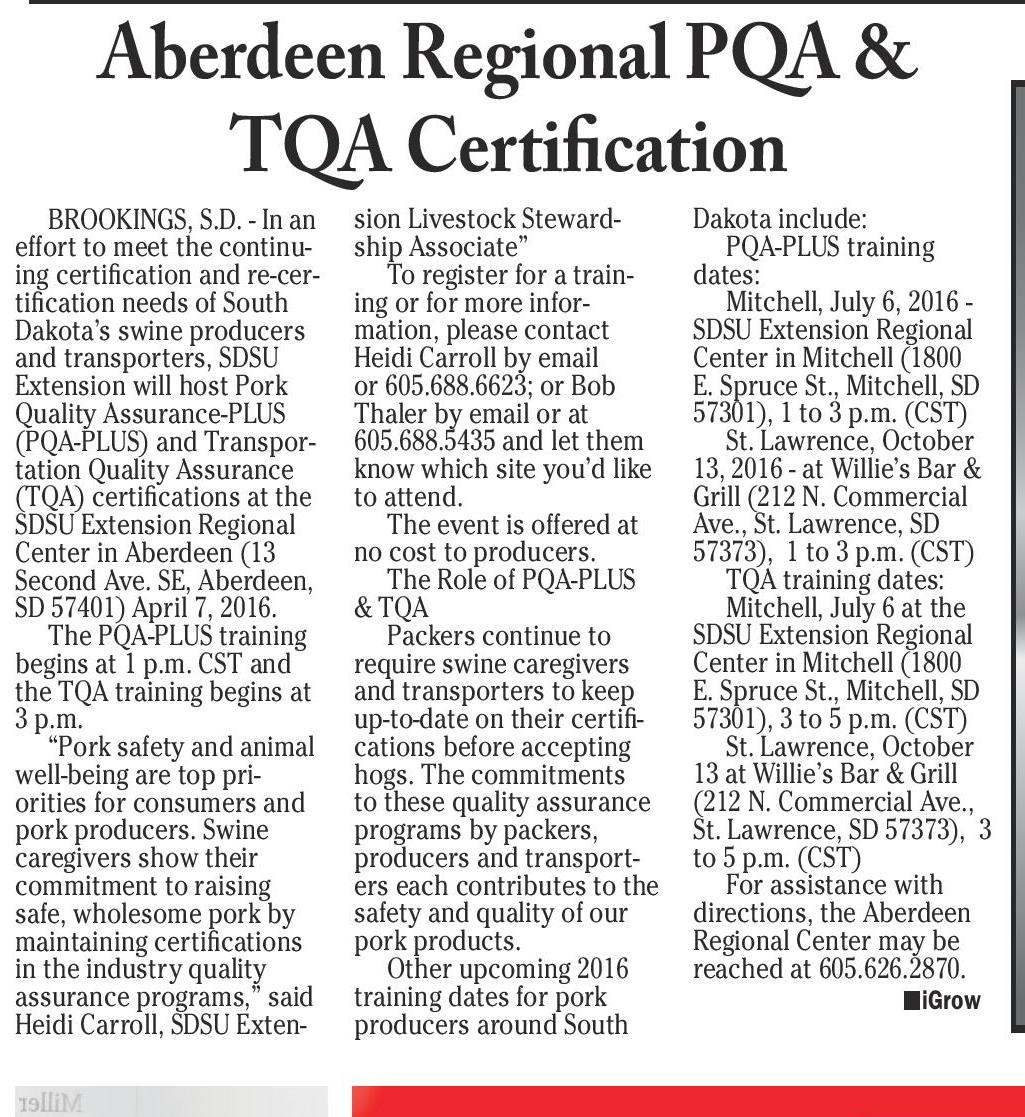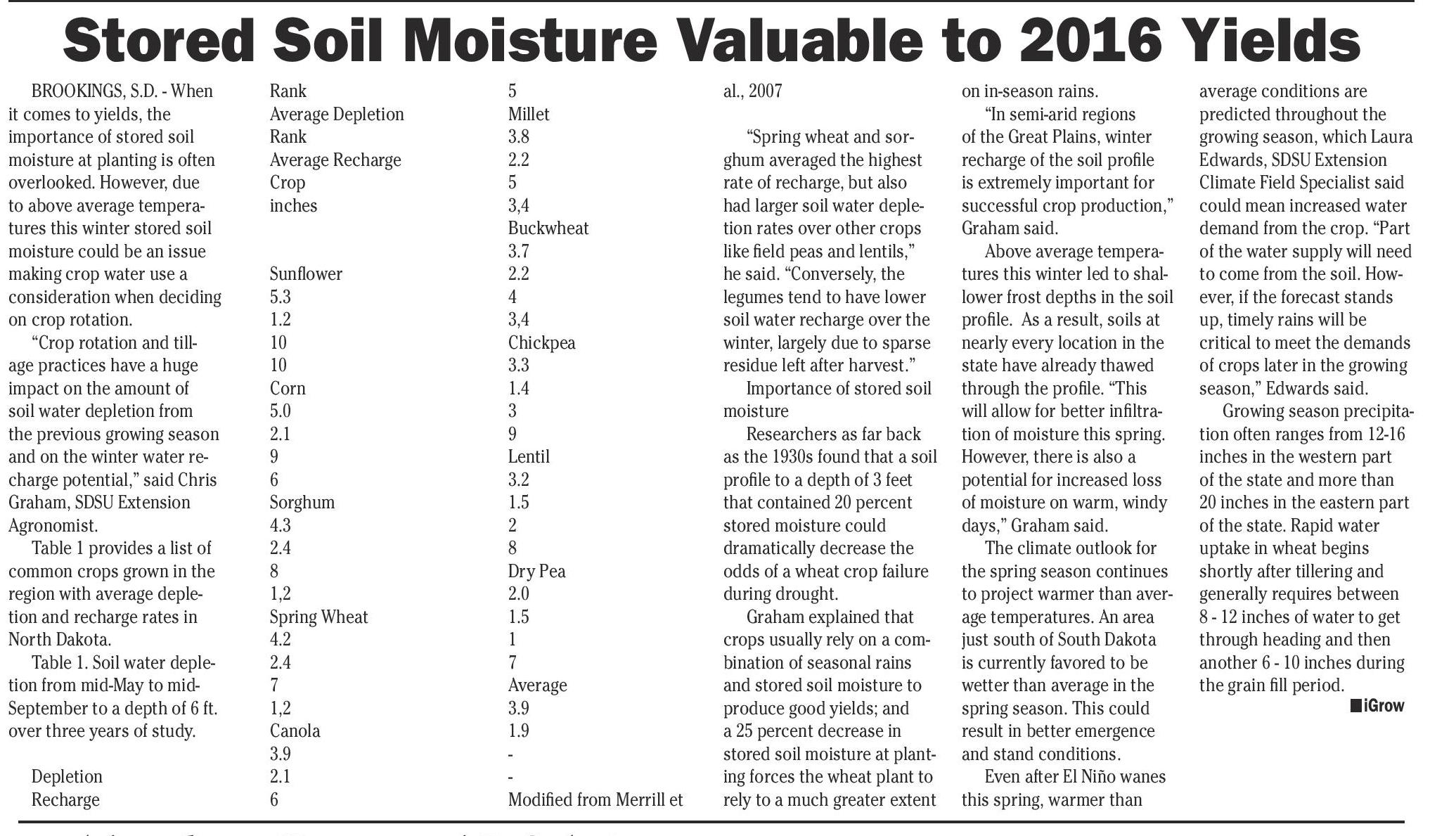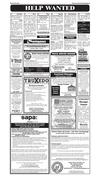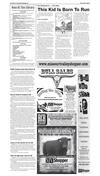9



shop online at www.missourivalleyshopper.com
March 29, 2016 • Page 9
Stored Soil Moisture Valuable to 2016 Yields
BROOKINGS, S.D. - When
it comes to yields, the
importance of stored soil
moisture at planting is often
overlooked. However, due
to above average temperatures this winter stored soil
moisture could be an issue
making crop water use a
consideration when deciding
on crop rotation.
“Crop rotation and tillage practices have a huge
impact on the amount of
soil water depletion from
the previous growing season
and on the winter water recharge potential,” said Chris
Graham, SDSU Extension
Agronomist.
Table 1 provides a list of
common crops grown in the
region with average depletion and recharge rates in
North Dakota.
Table 1. Soil water depletion from mid-May to midSeptember to a depth of 6 ft.
over three years of study.
Depletion
Recharge
Rank
Average Depletion
Rank
Average Recharge
Crop
inches
5
Millet
3.8
2.2
5
3,4
Buckwheat
3.7
2.2
4
3,4
Chickpea
3.3
1.4
3
9
Lentil
3.2
1.5
2
8
Dry Pea
2.0
1.5
1
7
Average
3.9
1.9
Modified from Merrill et
Sunflower
5.3
1.2
10
10
Corn
5.0
2.1
9
6
Sorghum
4.3
2.4
8
1,2
Spring Wheat
4.2
2.4
7
1,2
Canola
3.9
2.1
6
al., 2007
“Spring wheat and sorghum averaged the highest
rate of recharge, but also
had larger soil water depletion rates over other crops
like field peas and lentils,”
he said. “Conversely, the
legumes tend to have lower
soil water recharge over the
winter, largely due to sparse
residue left after harvest.”
Importance of stored soil
moisture
Researchers as far back
as the 1930s found that a soil
profile to a depth of 3 feet
that contained 20 percent
stored moisture could
dramatically decrease the
odds of a wheat crop failure
during drought.
Graham explained that
crops usually rely on a combination of seasonal rains
and stored soil moisture to
produce good yields; and
a 25 percent decrease in
stored soil moisture at planting forces the wheat plant to
rely to a much greater extent
on in-season rains.
“In semi-arid regions
of the Great Plains, winter
recharge of the soil profile
is extremely important for
successful crop production,”
Graham said.
Above average temperatures this winter led to shallower frost depths in the soil
profile. As a result, soils at
nearly every location in the
state have already thawed
through the profile. “This
will allow for better infiltration of moisture this spring.
However, there is also a
potential for increased loss
of moisture on warm, windy
days,” Graham said.
The climate outlook for
the spring season continues
to project warmer than average temperatures. An area
just south of South Dakota
is currently favored to be
wetter than average in the
spring season. This could
result in better emergence
and stand conditions.
Even after El Niño wanes
this spring, warmer than
average conditions are
predicted throughout the
growing season, which Laura
Edwards, SDSU Extension
Climate Field Specialist said
could mean increased water
demand from the crop. “Part
of the water supply will need
to come from the soil. However, if the forecast stands
up, timely rains will be
critical to meet the demands
of crops later in the growing
season,” Edwards said.
Growing season precipitation often ranges from 12-16
inches in the western part
of the state and more than
20 inches in the eastern part
of the state. Rapid water
uptake in wheat begins
shortly after tillering and
generally requires between
8 - 12 inches of water to get
through heading and then
another 6 - 10 inches during
the grain fill period.
niGrow
Aberdeen Regional PQA &
TQA Certification
BROOKINGS, S.D. - In an
effort to meet the continuing certification and re-certification needs of South
Dakota’s swine producers
and transporters, SDSU
Extension will host Pork
Quality Assurance-PLUS
(PQA-PLUS) and Transportation Quality Assurance
(TQA) certifications at the
SDSU Extension Regional
Center in Aberdeen (13
Second Ave. SE, Aberdeen,
SD 57401) April 7, 2016.
The PQA-PLUS training
begins at 1 p.m. CST and
the TQA training begins at
3 p.m.
“Pork safety and animal
well-being are top priorities for consumers and
pork producers. Swine
caregivers show their
commitment to raising
safe, wholesome pork by
maintaining certifications
in the industry quality
assurance programs,” said
Heidi Carroll, SDSU Exten-
sion Livestock Stewardship Associate”
To register for a training or for more information, please contact
Heidi Carroll by email
or 605.688.6623; or Bob
Thaler by email or at
605.688.5435 and let them
know which site you’d like
to attend.
The event is offered at
no cost to producers.
The Role of PQA-PLUS
& TQA
Packers continue to
require swine caregivers
and transporters to keep
up-to-date on their certifications before accepting
hogs. The commitments
to these quality assurance
programs by packers,
producers and transporters each contributes to the
safety and quality of our
pork products.
Other upcoming 2016
training dates for pork
producers around South
Dakota include:
PQA-PLUS training
dates:
Mitchell, July 6, 2016 SDSU Extension Regional
Center in Mitchell (1800
E. Spruce St., Mitchell, SD
57301), 1 to 3 p.m. (CST)
St. Lawrence, October
13, 2016 - at Willie’s Bar &
Grill (212 N. Commercial
Ave., St. Lawrence, SD
57373), 1 to 3 p.m. (CST)
TQA training dates:
Mitchell, July 6 at the
SDSU Extension Regional
Center in Mitchell (1800
E. Spruce St., Mitchell, SD
57301), 3 to 5 p.m. (CST)
St. Lawrence, October
13 at Willie’s Bar & Grill
(212 N. Commercial Ave.,
St. Lawrence, SD 57373), 3
to 5 p.m. (CST)
For assistance with
directions, the Aberdeen
Regional Center may be
reached at 605.626.2870.
niGrow
When you place your ad in the classifieds!
MV Shopper
MV Shopper
M I S S O U R I VA L L E Y
In Print and Online! • Call 665-5884
M I S S O U R I VA L L E Y
Congratulates
Mark’s Machinery, Inc.
Yankton Prairie Family Business of The Year
REAL ESTATE
RENTALS
AUTOMOTIVE
EMPLOYMENT
MERCHANDISE
COUPONS
the Missouri Valley
Shopper and
missourivalleyshopper.com
is your complete source
for buying and selling.
Everything you need
is just a click or call away!
Place an ad today by calling
605.665.5584
MV Shopper
M I S S O U R I VA L L E Y
The 2016 Yankton Prairie
Family Business of the
Year recipient is sponsored
annually by CorTrust Bank
and this year’s recipient is
Mark’s Machinery, Inc.
Mark’s Machinery, Inc. has
been in business since 1972.
It began with 3 employees
and now employs 47 people
in its 2 locations. First
generation owners Mark and
Patricia Hunhoff work hand in
hand with second generation,
Kevin and Jill Hunhoff. The
Hunhoff family is active in
the Yankton community
through the time, talent and treasure they provide many local
organizations.
Mark has been Chairman and served on Avera Sacred Heart
Board of Directors, Mount Marty College Board of Directors and
Avera Health Systems Finance Committee. He has also served
as a member on the Yankton Area Chamber of Commerce
Board and Ag Committee, Avera Sacred Heart Foundation
Board, Yankton County Historical Society, Yankton County
Safety Center Building Committee, Avera Health Systems
Board, Lewis and Clark Health & Education Board, Tri-State
Old Iron Club, Yankton Regional Aviation Association,
Retail Farm Equipment Association of South Dakota
and Minnesota, Case-IH Dealer Advisory Board,
and Mitchell Technical Institute Advisory
Board. Mark has been
a volunteer for the Farm
Safety for Kids Program
and Junior Achievement.
He has also received
awards from United Way
& Volunteer Services for
Volunteer Award and the SD
Association of Healthcare
for Distinguished Trustee
Award. Patty volunteers
her time at The Center and
Sacred Heart School.
Kevin currently serves
as a Board Member for
the Chamber of Commerce
and is on the Agri-Business
Committee. Jill has served on the Ambassadors Committee
and is a past Rotarian. Both families are active in the Catholic
Church. Mark’s Machinery has been a financial supporter for
the 4-H Club, The Boys & Girls Club and Yankton Area Ice
Association along with many other organizations and clubs in
Yankton and surrounding communities.
Mark’s Machinery is proud of the loyalty and longevity of
their employees; several have worked with the business for 30
years or more. Many of their customers are family businesses,
and they are now serving the second and third generations
of these families. Mark’s Machinery is very pleased that they
have remained a family owned business in an industry that has
experienced corporate consolidation over the years.
























 Previous Page
Previous Page





